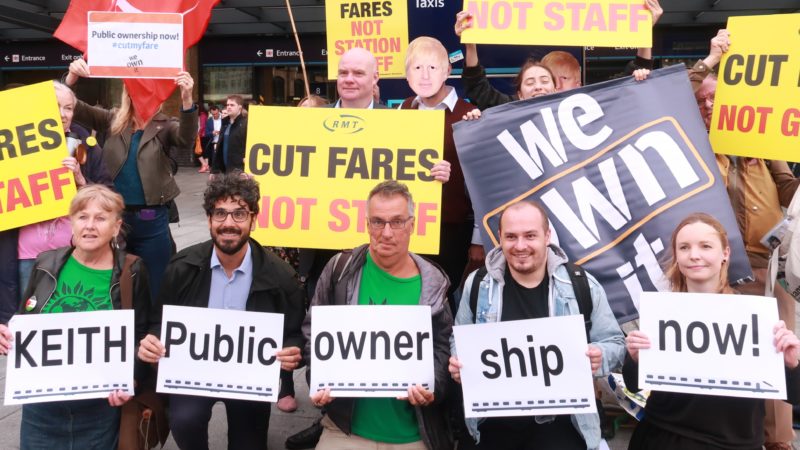Rewarding failure? Train fares have risen double the rate of wage growth over the past decade.

Protests are taking place across the country this week, as voters kick off against another round of rail fare rises.
Train fares are set to rise by 2.8% – despite franchise failures, delays, cancellations and continued fallout of last year’s timetable disaster.
The government is allowing the fare rise to go ahead – sparking protests at stations around the country organised by campaign group We Own It, including a coalition of campaigners, passengers, and unions at Kings Cross Station (pictured).
The fare rises – to take effect in January – will add more than £100 to many annual season tickets, and will mean that the overall cost of train travel has gone up by 46% since 2009. The figure is double the amount wages have gone up in that period, according to TUC analysis of ONS figures.
Campaigner Ellen Lees from We Own It said:
“It’s unacceptable that rail fares are going up yet again after the year we’ve had on the railways. Rail is already the most expensive way to travel around the country. This has to change.
“Public ownership of our railway could save us £1bn a year, to fund investment in new trains, electrification, or a drop in fares.”
Labour say some commuters will be paying over £3,000 more to travel to work than in 2010, with the highest increase projected to be on a Virgin Trains season ticket between Birmingham and London Euston – which will have risen by £3,188 since 2010 and now costs £11,205.
In Boris Johnson’s constituency the cost of an annual season ticket from West Drayton to London Paddington has risen by £583 since 2010.
Andy McDonald MP, Labour’s Shadow Transport Secretary, said:
“Every year, commuters are being asked to pay more money for bad train services.
“The government has sat back and allowed private train companies to cash in while people’s pay has been held back. Continuous fare rises undermine urgent action to tackle the climate emergency by pricing people off the railways.
“Labour will bring our railways into public ownership so they are run in the interests of passengers, not private profit.”
Campaigners are calling on Keith Williams, who is heading up the government’s review into the railways, to recommend public ownership in his White Paper in the autumn.
“Keith Williams has a chance to make a real, lasting change to our railway that will really deliver benefits for passengers – public ownership. He could cop out with incremental changes that don’t actually address the real problem, or he could be brave and commit to creating a railway that runs for people, not profit,” Lees said.
The protests come after new findings that private companies supplying trains to the railways paid out £1.2bn to shareholders between 2012 and 2018.
Josiah Mortimer is Editor of Left Foot Forward. Follow him on Twitter.
Left Foot Forward doesn't have the backing of big business or billionaires. We rely on the kind and generous support of ordinary people like you.
You can support hard-hitting journalism that holds the right to account, provides a forum for debate among progressives, and covers the stories the rest of the media ignore. Donate today.




3 Responses to “Commuters demand rail nationalisation as train fares set to rise AGAIN”
Chester Draws
“Labour will bring our railways into public ownership so they are run in the interests of passengers, not private profit.”
If they don’t run at a profit, then they run at a loss. Which means taxpayers pay. What it does not mean is that it is cheaper. It just means someone else pays.
If public ownership means it costs less, then I’m all for that. Which hasn’t been shown. Actually, hasn’t even been asserted. We’re merely expected to believe that government ownership will achieve miracles. Hiding the losses on the government’s books doesn’t mean they no longer exist.
So, Labour, show us how nationalising the railways will save money. If not, don’t do it.
Show us how will nationalising cut costs. Because paying the workers more, which you are pretty much bound to do, isn’t a good start. It will make you feel good, no doubt. But at the cost of the taxpayer.
Tom Sacold
80%+ of the rail system is already owned by the State. I see no reason why the State should subsidise very well paid middle-class commuters in the South-East !!!
The real public transport issue are the bus services. We need full renationalisation of local public transport so that we can have a return to the sort of regular services covering all communities with reasonable fares that were available before Thatcher’s privatisation.
Jonathan Bagley
I commute by train. The price of my annual season ticket seems reasonable and the train usually turns up. The main problem is overcrowding, which may be temporally improved when new trains are finally introduced. But, with the population increasing by 400 to 500K a year and increasing road congestion, this will only be temporary. I remember when rail was nationalised. My journey was worse then, with more decrepit, dirtier trains and far more delays and cancellations. I can’t see how renationalisation would improve things. There would be less investment – rail would be competing with the NHS, old age pensions etc; and also the rail unions would have more power. There would be even less chance of introducing more efficient, automated travel.